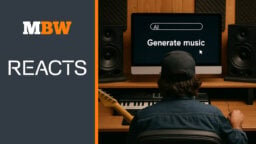Is the music industry really ready for the flood of music made by/with AI that will play out over the course of 2024?
You might have already heard of the astonishing volume of tracks being created on services like Boomy – where 19.5 million songs have been generated to date.
This year’s ‘big noise’, AI-music-wise, has come from two new startups: Suno and Udio, both of which appear to produce music with an obvious, ahem, influence from world-famous copyrighted material.
You may remember Udio: That’s the US-headquartered company co-created by ex-employees of Google’s DeepMind AI division.
Last month, Udio announced it had raised $10 million in a funding round led by Andreessen Horowitz… the very same tech investment giant that has argued that generative AI models should be permitted, under US law, to freely ingest copyrighted music.
(In the words of Andreessen Horowitz’s submission to the US Copyright Office last year: “Imposing the cost of actual or potential copyright liability on the creators of AI models will either kill or significantly hamper their development.”)
Udio, whose other investors include will.i.am and UnitedMasters, is attracting significant attention: it’s reported that over 600,000 people tested the platform out in its opening two weeks of public availability.
But that’s not the standout stat from a recent Bloomberg article covering the growth of Udio and Suno. This is: On average, Udio’s users are now creating ten tracks a SECOND on the platform.
We’re sure you can do the math there, but just in case you don’t have a calculator handy: That’s the equivalent of 864,000 tracks a DAY, or just over six million tracks a week.
While the service remains in beta, Udio users are permitted to make up to 1,200 free songs each month. Songs made on the platform can be up to 15 minutes in length.
Some big questions inevitably follow such incredible numbers, including but not limited to:
- (i) How many of these 864,000 daily tracks on Udio are ending up on music streaming services – and what does their arrival on said platforms mean for the ‘royalty pool’ that gets divided amongst artists and rights holders?
- (ii) How many of these 864,000 daily tracks bear an uncanny resemblance to music made by established artists? (Reminder: When AI expert Ed Newton-Rex used Udio to create tracks he generated music that bore clear similarities to established hits made by the likes of ABBA, The Beatles, and Elton John);
- (iii) How many of these 864,000 daily tracks then go on to compete for listener attention vs. the original tracks on which they draw influence?
An even more important question of all for the music biz?
- Will there ever be an industry-standard technology able to successfully ‘fingerprint’ copyrights that are fed into AI models – like that which is spawning Udio’s 864,000 daily tracks?
- Through this fingerprinting technology, will the creators of said original copyrights be able to consent to a license for – and get paid royalties by – services such as Udio?
That’s a question which, ultimately, may be decided in the courts.
Universal Music Group, the biggest music rightsholder of all, is currently embroiled in a legal battle against Amazon-backed generative AI platform Anthropic, with UMG accusing Anthropic of wilful copyright infringement of lyrics represented by the music company.
That flavor of lawsuit is not unique to the music industry: Over the past year, OpenAI – creator of ChatGPT – has been sued by a range of creators from different fields for allegedly stuffing its LLM (large language model) with copyrighted material without permission.
Those suing ChatGPT on these grounds (across multiple US lawsuits) include novelists John Grisham and Michael Connelly, comedian Sarah Silverman, author Ta-Nehisi Coates, and the New York Times.
Meanwhile, StabilityAI is being sued by Getty Images in both the UK and the US. Getty argues that Stability’s Stable Diffusion has been trained on over 12 million Getty-controlled photographs without permission “as part of [Stability’s] efforts to build a competing business.”
Some or all of these lawsuits may have teeth: Just last month, France’s competition watchdog announced it was fining Google EUR €250 million, after finding that Google’s AI-powered chatbot Bard – now rebranded as Gemini – had been trained on material from news publishers without their opt-in consent.
There is, however, evidence that the music industry will be taking a more collaborative approach with industry partners on AI models that can generate new tracks… fed by old tracks.
Example: At that same time it’s suing Anthropic, Universal Music Group is working in partnership with YouTube to develop experimental generative AI music tools.
Those tools include ‘Dream Track,’ via which YouTube Shorts creators in the US have been able to create “soundtracks” featuring the AI-generated voice and musical style of artists including Alec Benjamin, Charlie Puth, Charli XCX, Demi Lovato, John Legend, Sia, T-Pain, Troye Sivan, and Papoose.
Meanwhile, UMG last week announced a new licensing agreement with TikTok which the music company says has allayed its concerns over the use of AI-generated content on the platform.
In a letter to employees obtained by MBW subsequent to that deal announcement, UMG Chairman/CEO, Sir Lucian Grainge detailed promises he said TikTok had made to UMG over the impact of AI-made music on the platform’s ‘royalty pool’.
Said Grainge: “TikTok has now addressed the primary concern we expressed in our open letter that AI generated content would ‘massively dilute the royalty pool for human artists,’” writes Grainge.
“Further, they have made a number of commitments regarding AI that demonstrate respect for our artists’ and songwriters’ works and ‘rights of publicity’, as well as support of UMG’s principles on AI, including on training without consent.”Music Business Worldwide




